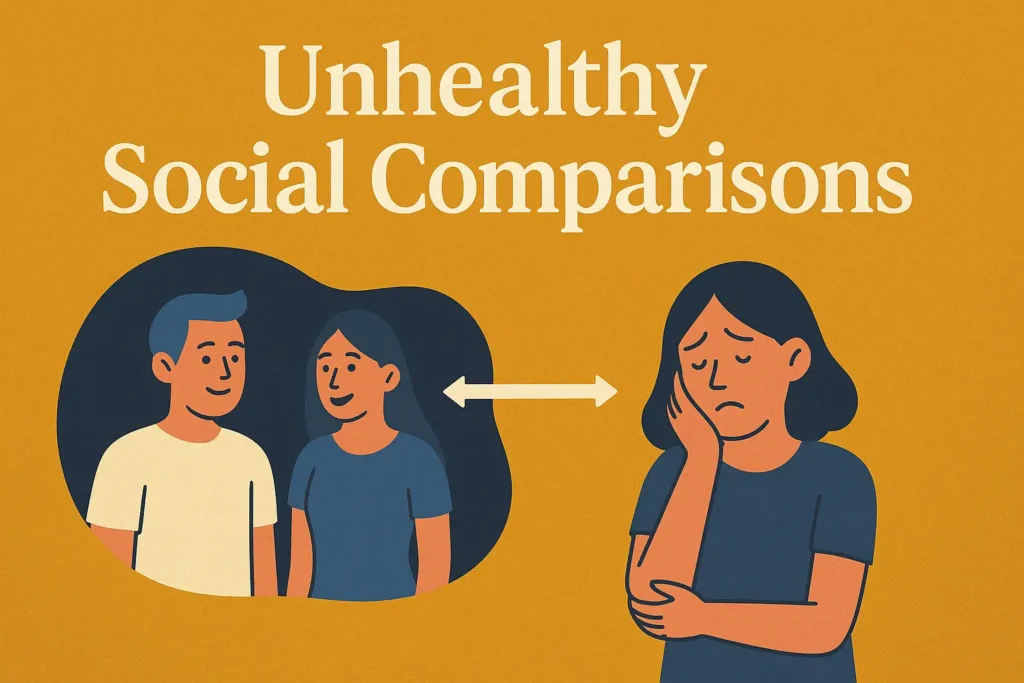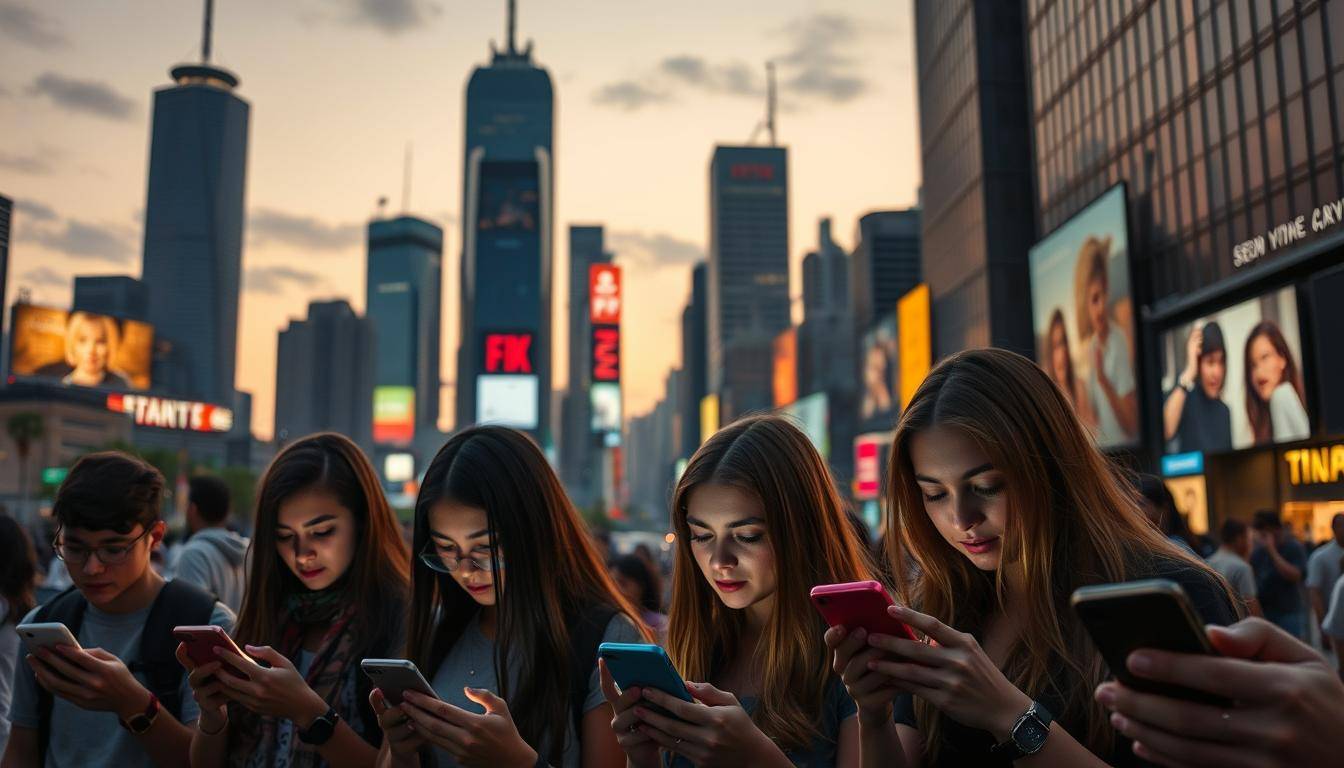“Comparison is the thief of joy,” Theodore Roosevelt once said—a truth that echoes painfully in today’s social media-driven world. Imagine training for years to run a marathon, only to feel defeated because someone else finished faster. This scenario isn’t hypothetical. Studies show countless high-achievers lose sight of their own progress when measuring against others’ highlight reels.
Take Sarah, a marathon runner who qualified for Boston after years of effort. Instead of celebrating, she fixated on a rival’s faster time posted online. Her victory felt hollow—a common experience when we anchor self-worth to external benchmarks. Platforms designed for connection often amplify this cycle, turning personal milestones into sources of doubt.
The cost goes beyond momentary frustration. Constant measuring against others’ lives drains creativity, fuels anxiety, and stalls growth. Research reveals people who frequently compare achievements experience 23% lower life satisfaction. Yet breaking free isn’t about ignoring others—it’s about reclaiming focus on your unique path.
Key Takeaways
- Frequent comparisons reduce life satisfaction by over 20%
- Social media amplifies unhealthy measuring of personal success
- Celebrating personal wins boosts motivation and self-esteem
- Focusing on others’ achievements hinders creative thinking
- Small daily comparisons accumulate into major energy drains
- Self-awareness is the first step to breaking the cycle
Understanding the Comparison Trap
Human brains have evolved to assess surroundings for survival—a trait that now fuels modern self-evaluation struggles. Psychologist Leon Festinger’s Social Comparison Theory explains this instinct: people gauge their worth by measuring against others. While this helped ancestors navigate tribal hierarchies, today’s digital landscape amplifies it into an exhausting cycle.

The Biology of Measuring Up
Early humans compared resources and skills to secure alliances and avoid threats. This survival mechanism now manifests as checking salaries, social media likes, or career milestones. Neuroscience reveals these evaluations activate brain regions linked to pain and reward—explaining why scrolling through others’ achievements can feel physically draining.
When Competition Becomes Toxic
Healthy rivalry motivates growth. But constant measuring against others’ lives creates a mental quicksand. Consider a vineyard worker proud of their harvest—until noticing a neighbor’s larger crop. Joy turns to frustration, despite personal success. Modern media accelerates this shift by showcasing curated “success stories” 24/7.
| Aspect | Healthy Comparison | Harmful Trap |
|---|---|---|
| Purpose | Inspires improvement | Creates self-doubt |
| Emotional Impact | Brief motivation spike | Long-term anxiety |
| Outcome | Clear next steps | Paralysis & stagnation |
Societies normalize these patterns through education systems and workplace rankings. Yet awareness of this ingrained behavior offers power—recognizing automatic judgments allows conscious redirection of mental energy toward personal progress.
The Impact of Social Media on Mental Health
Platforms designed for connection often become battlegrounds for self-worth. A 2023 Journal of Social Psychology study found 68% of users compare their lives to others within 10 minutes of scrolling. This digital habit reshapes how people perceive success—and themselves.

Unrealistic “Highlight Reels” and Its Effects
Social media feeds prioritize perfection over authenticity. Vacation photos hide financial stress. Career announcements omit rejections. Researchers at the University of Pennsylvania discovered users who compare others’ curated posts experience 32% higher anxiety levels than those focusing on real-life connections.
This distortion creates a double world—one virtual, one tangible. A marketing director might celebrate a promotion, only to feel like a failure after seeing a peer’s luxury car post. The brain struggles to separate filtered snapshots from everyday reality, eroding mental health over time.
| Aspect | Social Media Perception | Real Life Reality |
|---|---|---|
| Success | Overnight achievements | Years of unseen effort |
| Relationships | Constant harmony | Normal conflicts |
| Appearance | Flawless filters | Natural imperfections |
Daily exposure to these illusions makes people feel inadequate, even when thriving offline. Teens spending 3+ hours daily on platforms show 60% higher depression rates, per CDC data. The solution isn’t deletion—it’s recognizing that feeds showcase edited moments, not full stories.
Recognizing the Signs and Consequences of Comparing Others
You scroll through a friend’s tropical vacation photos while eating microwave noodles—suddenly your weekend plans feel inadequate. This instant self-evaluation reveals a deeper pattern. A 2024 Journal of Behavioral Science study found people spend 2.3 hours daily mentally measuring their lives against others’, often without conscious awareness.

Emotional Toll and Reduced Self-Esteem
Persistent self-doubt often signals unhealthy evaluation habits. Therapists identify three key markers: joy turning to resentment when others succeed, reluctance to celebrate personal wins, and obsessive social media checking. Emma, a high school teacher, stopped attending friends’ gatherings after comparing her modest home to their renovated kitchens—a spiral that led to clinical depression within six months.
These patterns strain relationships. Research shows 58% of adults feel disconnected from peers when viewing their achievements as threats. Colleagues who once collaborated start withholding opportunities, fearing others’ professional success might overshadow their own.
| Healthy Interaction | Strained Relationship |
|---|---|
| Shared celebrations | Silent competition |
| Mutual support | Defensive communication |
| Genuine happiness | Forced enthusiasm |
Chronic self-evaluation doesn’t just drain time—it rewires brains. UCLA neuroscientists found repeated negative comparisons shrink the prefrontal cortex, impairing decision-making abilities. The good news? Noticing these red flags creates space for change. Like realizing your phone’s low battery warning, awareness allows course correction before total energy depletion.
Strategies to Break Free from Negative Comparisons
Breaking free from draining mental patterns requires intentional action. Start by tracking moments when your feelings shift during the day—like tension while scrolling or envy during team meetings. These emotional cues reveal hidden triggers.

Rewire Your Digital Habits
Set app limits to 30 minutes daily—most smartphones track usage automatically. Curate your feed by muting accounts that spark insecurity. “Digital spaces should uplift, not diminish,” notes therapist Dr. Alicia Monroe. Replace endless scrolling with 5-minute reflection sessions asking: “How does this serve my growth?”
| Old Habit | New Practice |
|---|---|
| Morning scroll | Journal three wins |
| Comparing salaries | Listing new skills learned |
| Posting for likes | Sharing authentic stories |
Build a Gratitude Framework
Each evening, write one achievement—no matter how small. Did you finish a project phase? Walked 8,000 steps? Celebrate it. Research shows people who track daily progress increase self-esteem by 41% in eight weeks.
Try this reframing technique: When noticing someone’s success, add “and I’m proud of…” to redirect focus. A teacher might think, “My colleague published a book—and I’m proud of creating a new curriculum this term.” This way of thinking transforms envy into mutual celebration.
Shifting from Comparison to Healthy Competition
A 2024 Stanford study revealed professionals who reframe social comparisons as learning opportunities experience 37% higher job satisfaction. This mental shift transforms a common human tendency into fuel for growth—without the emotional drain of constant measuring.

Embracing Inspiration Over Envy
“Inspiration says ‘I can grow from this,’ while envy whispers ‘I’m not enough,'”
Healthy competition thrives when focusing on shared progress rather than individual rankings. Consider two chefs: one obsesses over rivals’ Michelin stars (tendency toward envy), while another studies their techniques to enhance her own menu (tendency toward growth). The latter approach strengthens professional relationships through mutual respect.
| Inspiration-Driven | Envy-Fueled | |
|---|---|---|
| Focus | Collaborative growth | Personal shortcomings |
| Emotional Impact | Energy-boosting | Draining |
| Outcome | Skill development | Stalled progress |
Software developer Marcus transformed his perspective after feeling threatened by colleagues’ coding posts. Instead of hiding their achievements, he started hosting weekly skill-sharing sessions. This simple thing—celebrating others’ wins—became a vital part of his team’s success. Their project completion rate jumped 22% within three months.
Today’s digital world makes it easy to fixate on polished posts. Yet shifting focus to “How can this help me improve?” turns scrolling into strategic learning. When a friend shares career news, try adding “That’s awesome—tell me how you did it!” This builds authentic relationships while channeling natural competitive tendencies productively.
Nurturing Self-Esteem and Personal Growth
Imagine standing before a mirror, not scrutinizing flaws but celebrating strengths—a practice reshaping self-perception in the digital era. Building lasting confidence requires tools that anchor self-worth to internal growth rather than fleeting external validation.

Positive Self-Talk and Mindfulness Techniques
Neuroscience confirms what ancient practices taught: words shape reality. Replacing “I’ll never be good enough” with “I’m improving daily” activates brain regions linked to resilience. Therapists recommend morning affirmations paired with breathwork—a 5-minute ritual shown to reduce anxiety by 29% in UCLA trials.
Books like Radical Acceptance by Tara Brach provide actionable frameworks. One exercise involves writing three past struggles you’ve overcome each week. This practice helps recognize growth patterns often overshadowed by daily social comparisons.
| Negative Self-Talk | Mindfulness Alternative |
|---|---|
| “They’re more successful at my age” | “My journey has unique timing and value” |
| “I need to post more to keep up” | “My worth isn’t tied to likes or shares” |
| “Why can’t I achieve that?” | “What steps align with my goals today?” |
Reducing time on social media creates space for self-reflection. Try setting phone-free hours while journaling achievements. As psychologist Dr. Ellen Langer notes: “Mindfulness isn’t complicated—it’s remembering to remember your own progress.” This shift helps transform envy into fuel for personal milestones.
Practical Tips for Managing Comparison in Everyday Life
Maya, a graphic designer, deleted her social apps every Sunday—a simple habit that helped her reconnect with personal growth. Her story illustrates how small changes can restore balance in a world obsessed with measuring up. Start by identifying moments when reality feels distorted by others’ curated posts—these are opportunities to reclaim your narrative.

Actionable Steps to Celebrate Your Unique Path
Create a weekly “win jar” to track achievements. Write small victories on slips of paper—completed projects, kind gestures, or new skills learned. This tangible practice combats low self-esteem by making progress visible. Research shows people who document wins weekly experience 34% higher motivation levels.
Try the “5-4-3” technique when envy strikes: Name 5 things you appreciate about your current situation, 4 goals you’re actively pursuing, and 3 recent accomplishments. This grounding exercise aligns focus with reality rather than idealized online personas.
Creating a Balanced Digital Routine
Set specific time social media limits using phone features like Screen Time (iOS) or Digital Wellbeing (Android). Designate tech-free zones—dinner tables and bedrooms work best. A 2024 UC Berkeley study found participants who implemented these boundaries reduced anxiety triggers by 41%.
Schedule monthly “comparison audits”: Review followed accounts and ask, “Does this content inspire or deplete me?” Unfollow profiles that trigger unhealthy comparisons, replacing them with educational or uplifting feeds. As experts suggest, curating your digital environment is crucial for mental health.
Integrate offline rituals that reinforce self-worth. Morning walks without phones or evening gratitude journaling create space for authentic personal growth. These practices help recognize that reality contains both struggles and triumphs—unlike the perfection often displayed online.
Conclusion
Reclaiming your mental energy begins with one powerful choice—valuing your journey above others’ milestones. Studies confirm adults who track personal progress experience 41% higher motivation and life satisfaction. The strategies shared—from digital detoxes to gratitude practices—empower you to transform draining habits into fuel for growth.
Limiting exposure to curated social media content reduces anxiety triggers by nearly half, as shown in recent research. This shift lets adults focus on authentic achievements rather than filtered information. Small daily actions, like celebrating small wins or reframing envy as curiosity, rebuild self-worth over time.
Ready to start? Apply these techniques today: mute accounts that spark doubt, journal three weekly victories, and redirect energy toward your unique goals. As highlighted in expert insights, interrupting the comparison reflex creates space for meaningful change.
Remember—growth isn’t about outshining others. It’s about nurturing your potential, one intentional step at a time. Your path holds value exactly as it unfolds.
FAQ
Why do people constantly compare themselves to others?
Evolutionary biology primes humans to gauge their status within groups—a survival mechanism. Today, social media amplifies this tendency by showcasing curated successes, triggering automatic mental measurements against peers. Awareness of this instinct helps individuals consciously redirect their focus.
How does social media worsen feelings of inadequacy?
Platforms like Instagram and TikTok emphasize polished “highlight reels” that rarely reflect reality. Seeing others’ career milestones, vacations, or relationships without context distorts perceptions of normalcy—often fueling anxiety or depression. Studies link excessive scrolling to lower self-esteem in 60% of frequent users.
What are signs that comparing others is harming mental health?
Persistent envy, intrusive thoughts about others’ achievements, or feeling “stuck” despite personal progress indicate unhealthy patterns. Physical symptoms like fatigue or insomnia may follow. Recognizing these red flags allows proactive steps toward mindset shifts.
Can limiting screen time reduce negative self-talk?
Yes. A 2023 University of Pennsylvania study found participants who cut social media use to 30 minutes daily reported higher life satisfaction in two weeks. Pairing this with gratitude journaling or listing daily wins reinforces self-worth beyond digital metrics.
How can someone turn envy into motivation?
Reframe others’ successes as proof of what’s possible—not threats. For example, instead of thinking “They’re better than me,” ask “What strategies can I learn from them?” This mindset fosters collaboration over competition, aligning with long-term growth.
What daily habits build resilience against social comparisons?
Morning affirmations, meditation, and setting personalized goals (not influenced by trends) create internal validation. Platforms like Headspace offer guided sessions to stay grounded. Curating feeds to follow educators—not just influencers—also balances perspective.
Are certain age groups more prone to comparison struggles?
Research shows adults aged 18–34 experience the highest rates of social media-induced anxiety. However, midlife professionals often face “success benchmarking” pressures. Tailored strategies—like LinkedIn detoxes or mentorship—address unique triggers across life stages.




























































